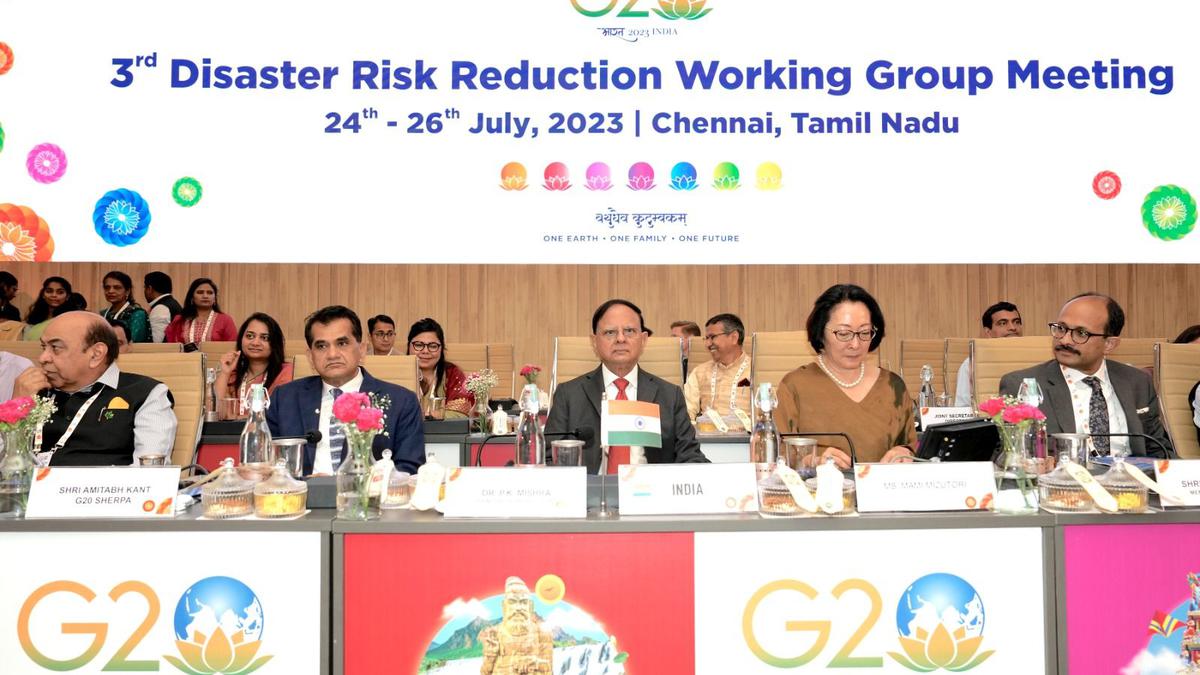
G20 Working Group Meeting | We must mobilise private finance for disaster risk reduction: P.K. Mishra
The Hindu
India has transformed DRR financing, creating a predictable mechanism for responses, mitigation, preparedness & recovery. G20 must create an enabling environment to attract private finance for DRR & make it part of core business. Need to think beyond pilots & design initiatives for scale.
Over the past few years, India has completely transformed the way disaster risk reduction is financed, said Principal Secretary to the Prime Minister, P. K. Mishra.
Speaking at the Third Meeting of the G20 Disaster Risk Reduction Working Group in Chennai on Monday, Mr. Mishra said India now has a predictable mechanism for financing not just disaster responses but also disaster mitigation, preparedness and recovery. “Can we have analogous arrangements at the global level as well? Mobilising private finance for disaster risk reduction has been a challenge but without it we will not be able to go very far in addressing all the disaster risk reduction needs,” said Mr. Mishra.
“What kind of enabling environment should the governments create to attract private finance into disaster risk reduction? How can G20 generate momentum around this area and ensure that private investment in disaster risk reduction is not only an expression of corporate social responsibility but part of the core business of firms?” he asked.
Pointing to the challenge the world faces today, Mr. Mishra said cities in almost the entire northern hemisphere have been in the grip of massive heat waves. “The forest fires in Canada and the haze that followed affected cities in many parts of North America. Here in India, we have seen major cyclonic activity on both our east and west coast. Delhi experienced its worst flood in 45 years. And we are not even halfway through the monsoon season! The impacts of climate change-related disasters are not out into the distant future. They are already here. They are enormous. They are interconnected. And they affect everyone across the planet. The challenge that the world faces today underlines the importance of this Working Group,” he said.
“In the short span of four months, the Working Group has made a lot of progress and generated good momentum. However, we need to do more. The ambition of this Working Group must match the scale of problems we face. The time for incremental change has passed. We need transformation of local, national and global systems for preventing the creation of new disaster risks and effectively managing existing disaster risks,” said Mr. Mishra.
Stressing the need for disparate national and global efforts to actively seek convergence and maximise their collective impact, Mr. Mishra said, in the area of financing disaster risk reduction, it is important that we pursue structured mechanisms at all levels for financing all aspects of disaster risk reduction. “We cannot afford fragmented efforts that are driven by narrow institutional perspectives. We must be driven by a problem-solving approach. The UN Secretary General’s ‘Early Warning For All’ initiative is an example of this approach. It is good to note that G20 has identified ‘Early Warning and Early Action’ as one of the five priorities and is putting its full weight behind it,” said Mr.Mishra.
”In the area of disaster resilient infrastructure, we are already seeing the benefits of the Coalition for Disaster Resilient Infrastructure we established in partnerships with a number of G20 nations, the UN, and others a few years ago. The Coalition’s work is informing how countries, including Small Island Developing Countries, can use better risk assessments and metrics to upgrade their standards and make more risk-informed investments in infrastructure development. It is important that we work towards taking these ideas to scale. We have to think beyond pilots and design our initiatives for scale,” he said.













